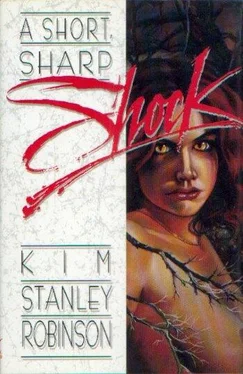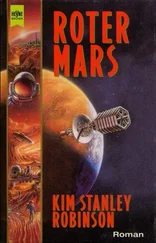Sometime before dawn he was awakened by a crowd of folk banging in the doorway. They held him down and searched under his skirt. They had broad hard hands. Cloaks made of small leaves sewn together clicked in the dark, and it smelled like oranges.
“Are you the spine kings?” he asked, drunk with sleep.
They laughed, an airy sound. One said, “If we were you’d be strangled with your own guts by now.”
“Or tossed down the cliff.”
The first voice said, “Or both. The spine kings’ hello.”
They all had lumps on their left shoulders, irregular dark masses that looked like shrubs. They took him out of the hut, and under the sea-colored sky he saw that the lumps were in fact shrubs—miniature fruit trees, it appeared, growing out of their left shoulders. The fruits were fragrant and still reminded him of oranges, although the smell had been altered by the salt tang, made more bitter. Round fruit, in any case, of a washed-out color that in better light might have been pale green.
The members of this group arranged themselves in a circle facing inward, took off their leaf cloaks and sat down. He sat in the circle between two of them, glancing at the shoulder tree to his right. It definitely grew directly out of the creature’s skin—the gnarled little roots dove into the flesh just as a wart would, leaving an overgrown fissure between bark and skin.
With a jerk he looked away. It was almost dawn, and the treefolk began singing a low monophonic chant, in a language he didn’t recognize. The sky brightened to its day blue, slightly thickened by the sun’s absence, and the wind suddenly picked up, as if a door had banged open somewhere—a cool fresh breeze, peeling over the spine in the same moment that the sun pricked the distant gray line of the horizon, a green point stretching to a line of hot yellow and then a band of white fire, throwing the sea’s surface into shadow and revealing a scree of low diaphanous cloud. Before the sun had detached itself from the sea each member of the circle had plucked a fruit from the shoulder of the person on their right, and when the sun was clear and the horizon sinking rapidly away from it, they ate. Their bites caused a faint crystalline ringing, and the odor of bitter oranges was strong. He felt his stomach muscles contract, and saliva ran down his throat. The celebrant nearest the sun glanced at him and said, “Treeless here will be hungry.”
He almost nodded, but held himself still.
“What’s your name?” the celebrant asked. He had been the first speaker in the hut.
“I don’t know.”
“No?” The creature considered it. “Treeless will be good enough, then. In our naming language, that is Thel.”
In his mind he called himself Thel. But his real name… Black space, behind his nose, in the sky under his skull.… “It will do here,” he said, and waved a hand. “It is accurate enough.”
The man laughed. “So it is. I am Julo.” He looked across the circle. “Garth, come here.”
A young man stood. He had been sitting opposite Julo, facing out from the circle, and now Thel noticed his tree grew from the right shoulder rather than the left.
“This is Garth, which means Rightbush. Garth, give Thel here an apple.” Garth hesitated, and Julo strode across the circle of watchers and cuffed him on the arm. “Do it!”
Garth approached Thel and stood before him, looked down. Thel said to him, “Which should I choose?”
With a grateful glance up the youth indicated the largest fruit, on a lower branch. Thel took the round green sphere in his fingers and pulled sharply, noting Garth’s involuntary wince. Then he sniffed the stem, and bit through the skin. The bitter taste of orange, he sat in a small dark room, watching the wick of a lamp lit by a match held in long fingers, the flame turned up and burning poorly, in a library with bookcases for walls and a huge old leather globe in one corner.… He shook his head, back on the windy dawn spine, Julo’s laughter in his ear, behind that a crystalline ringing. A bird hovered in the updraft, a windhover searching the lee cliff for prey. “Thank you,” Thel said to Garth.
The treefolk gathered around him, touched his bare shoulders, asked him questions. He had nothing but questions in reply. Who were the spine kings? he asked, and their faces darkened. “Why do you ask?” Julo said. “Why don’t you know?”
Thel explained. “The fisherfolk pulled me from the sea. Before that—I don’t know. I can’t…” He shook-his head. “They pulled out a woman with me, a swimmer, and sold her to the spine kings.” He gestured helplessly, the thought of her painful. Already the memory of her was fading, he knew. But that touch in the moonlight—“I want to find her.”
“They have some of our people as well,” Julo said. “We’re going after them.” He reached into his bag and threw Thel a leaf cloak and a pair of leather moccasins with thick soles. “You can come along. They’re at Kataptron Cove, for the sacrifices.”
The boy’s fruit was suddenly heavy on his stomach, and he shuddered as if every cell in him had tasted something bitter.
5. The Snake and the Tree
The treefolk hiked long and hard, following a line on the broad crest that minimized the ups and downs, nearly running along a rock road that Thel judged to be some three thousand feet above the sea. After a few days, the south side of the sinuous peninsula became a fairly gentle slope, cut by ravines and covered with tall redwood trees; in places on this side the beach was a wide expanse, dotted with ponds and green with rippling dune grass. The north side, on the other hand, remained a nearly vertical cliff, falling directly into waves, which slapped against the rock unbroken and sent bowed counterwaves back out to the north, stippling the blue surface of the water with intersecting arcs.
Once their ridge road narrowed, and big blocky towers of pink granite stood in their way. The trail reappeared then, on the sunny southern slope, and they followed it along a contoured traverse below the boulders, passing small pools that looked hacked into the rock. Half a day of this and they had passed the sharp peaks and were back on the ridge, looking ahead down its back as it snaked through the blue ocean. “How long is this peninsula?” Thel asked, but they only stared at him.
Every morning at sunrise Julo ordered young Garth to provide a shoulder apple for Thel’s consumption, and in the absence of any other food Thel accepted it and ate hungrily. He saw no more hallucinations, but each time experienced a sudden flush of pinkness in his vision, and felt the bitter tang of the taste to his bones. His right shoulder began to ache as he lay down to sleep. He ignored it and hiked on. He noticed that on cloudy days his companions hiked more slowly, and that when they stopped by pools to rest on those days, they took off their boots and stuck their feet between cracks in the rock, looking weary and relaxed.
Some days later the peninsula took a broad curve to the north, and for the first time the sun set on the south side of it. They stopped at a hut set on a particularly high knob on the ridge, and Thel looked around at the peninsula, splitting the ocean all the way to the distant horizon. It was a big world, no doubt of it; and the days and nights were much longer than what he had been used to, he was sure. He grew tired at midday, and often woke for a time in the middle of the long nights. “It doesn’t make sense,” he said to Garth, waving, perplexed at the mountainous mound zigzagging across the sea. “There isn’t any geological process that could create a feature like this.”
This was said almost in jest, given the other more important mysteries of his existence. But Garth stared at him, eyes feverish. He was lying exhausted, his feet deep in a crack; seeing this in the evenings Thel always resolved not to eat, and every morning he awoke too ravenous to refuse. Now, as if to pay Garth back with conversation, he added, “Land floats like wood, thick cakes of it drifting on slow currents of melted rock below, and a peninsula like this, as tall as this… I suppose it could be a mid-oceanic ridge, but in that case it would be volcanic, and this is all granite. I don’t understand.”
Читать дальше












